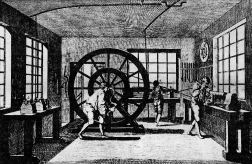Paula Zerzan
Paula Zerzan
Muswell Hillbillie
Comments on Revolutionary Violence
The authors respond
Hi FE Folks,
After reading the two letters (FE #287, October 28, 1977) responding to my article in the August FE (#285, August, 1977), I have decided to abandon the use of the term “terrorism,” because I think it does tend to obscure more than it clarifies.
I agree with Laurance Kisinger that there is nothing essentially terrifying about an empty government building or an isolated utility being blown up; but I don’t think that there is necessarily anything revolutionary about it either. I don’t think that this kind of activity is “mindless violence” as Ervin—who obviously refused to really read the article on principle or perhaps sent his letter to the wrong address—asserts. But we all have to become more aware of what challenges and what perpetuates the status quo.
Mar 22, 2018 Read the whole text...
Fifth Estate Collective
John Zerzan
Paula Zerzan
E.B. Maple (Peter Werbe)
Bob Brubaker
Examining Zerzan
Excerpts from Fifth Estate history
Much of primitivist theorist John Zerzan’s early work appeared in the Fifth Estate. His Cassandra-like predictions of imminent collapse of modern society began in 1976 with his FE article, “The Decline and Fall of Everything” [FE # 268, January, 1976]—a compendium of statistics of social dislocation.
Mar 7, 2014 Read the whole text...
John Zerzan
Paula Zerzan
Industrialism & Domestication
In the late 18th and early 19th centuries, the rise of capitalism was met by bitter and intense resistance. Its establishment was only effectuated by the imposition of the factory system as a method of social control. The result was a tamed working class and a degradation of labor which lives today at the core of the marxist conception of socialism.
Feb 24, 2018 Read the whole text...
John Zerzan
Paula Zerzan
Medieval Revolts against Church and State
In a fairly recent booklet, I came across a very standard view of pre-modern class society. It was stated that the life of the individual was completely controlled, and based on something quite external to him.
“The central mode of experience in pre-capitalist society was the event, principally the religious/historical event—Christ on the cross,” it explained further.
Jan 24, 2016 Read the whole text...
John Zerzan
Paula Zerzan
New York, New York
The blackout of 1977
“Amid All the Camaraderie is Much Looting this Time; Seeing the City Disappear.”
—Wall Street Journal headline, July 15
The Journal went on to quote a cop on what he saw, as the great Bastille Day break-out unfolded: “People are going wild in the borough of Brooklyn. They are looting stores by the carload.” Another cop added later: “Stores were ripped open. Others have been leveled. After they looted, they burned.”
Dec 29, 2017 Read the whole text...
John Zerzan
Paula Zerzan
Notes on Captivity
“Few books today are forgivable. Black on the canvas, silence on the screen, an empty white sheet of paper, are perhaps feasible.”
— R.D. Laing, The Politics of Experience
—a philosophy, a school: private property
—a substitute self-identity
—a barrier to life: mediation
—dependency
May 2, 2017 Read the whole text...
John Zerzan
Paula Zerzan
“Revolt Against Work” or the End of Leftism?
FE Note. The December 1976 Fifth Estate carried a critique by Charles Reeve (see “The Revolt Against Work or Fight for the Right to Be Lazy,” p. 9) of the contentions of John and Paula Zerzan that the crisis point in capitalism today revolves around worker alienation, job refusal, sabotage, absenteeism, etc. Reeve asserted that on one hand, the significance of this phenomenon is overplayed by the Zerzans and on the other, that to the extent that it does exist, it represents nothing new in workers’ struggles.
Jan 2, 2016 Read the whole text...
John Zerzan
Paula Zerzan
The Decline and Fall of Everything
The landscape of capitalism is a global one, existing everywhere with only minor variations. But this universal reign of the paycheck and the price-tag is approaching a state of crisis, becoming noticeable to all but those whose idea of politics excludes everyday reality.
Naturally enough, this crisis of the spirit, this nearing collapse of daily routine, is reaching its most acute forms thus far in America, capital’s most advanced arena.
Dec 19, 2013 Read the whole text...
John Zerzan
Paula Zerzan
Who Killed Ned Ludd?
A History of Machine Breaking at the Dawn of Capitalism

The argument that the advent of capitalism brought a rise in the standard of living for workers has been refuted before, but is shown graphically in these two prints. Prior to the dominance of the capitalist economy and the establishment of the first factories in England, manufacturing was done in small shops and cottages overseen by a working master craftsman employing several apprentices and helpers. At left is a typical 18th Century establishment (1740) using foot and crank powered lathes. Large windows were the only source of light and regulated working time.
Nov 20, 2014 Read the whole text...
